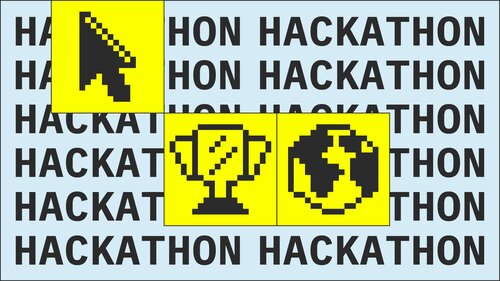Behind the Scenes of the European Hackathon Championship: A Conversation with the Initiators
Behind the Scenes of the European Hackathon Championship: A Conversation with the Initiators
Where did the idea for a Europe-wide hackathon come from?
Adam Dziedzic: It started with two hackathons that we co-organized in Poland. They were a huge success. Afterwards, we talked to people about them and they were really inspired by what we had done. Our director was especially keen to expand beyond just a single hackathon. This is how we came up with the idea of organizing a Europe-wide hackathon championship.
Franziska Boenisch: We are familiar with the concept of hackathons involving tasks and competition. That’s how we organize our teaching. We believe it’s important in teaching to give people the opportunity to explore hands-on as it’s the best way for people to learn. In our course on trustworthy machine learning at Saarland University, there are lots of hands-on tasks which are automatically graded with a scoreboard. This allows students to compete interactively and see how they perform compared to other students which is highly motivating for many people. Additionally, all tasks, both in the course and in the hackathons, are directly inspired by our day-to-day research, tackling actual real-life challenges around trustworthy ML that are relevant right now.
Some previous participants of the Hackathon in Poland joined you at CISPA in the SprintML Lab. What has your experience been like?
Dziedzic: This was one of the best experiences we’ve had with interns. They were actually the winners of the hackathons in Poland, and joining CISPA as interns was one of the prizes. They were already well prepared through the hackathon and ready to take on such tasks. Then they came to expand their knowledge in the areas of AI and cybersecurity with us. After that, they were able to publish a paper at ICLR, one of the most prestigious ML conferences. They did an amazing job! During their internship, some of them travelled to China for the International Olympiad in Artificial Intelligence. The amazing news from China was that one of them won the Olympiad, while two others also won gold and silver medals.
The Hackathon Championship is a Europe-wide initiative. What are your goals for this project?
Boenisch: We want to advocate for trustworthy machine learning. Machine learning is everywhere these days: It’s in the devices we use, and it’s always in the news. The most important thing is that it remains trustworthy. As researchers, we understand how predictions are made. We know that they are not faulty, that they are fair, and that our data is handled carefully. We need to raise awareness of the topic and give people the opportunity to gain hands-on experience of how to attack the models and make them more robust. This is what we need to encourage people to work on.
Dziedzic: We are very happy to see that people who join our hackathons continue to work on these topics and want to join CISPA in the future. It is very satisfying for us to see more and more people getting into these fields and working on these topics.
A hackathon involves solving specific tasks within 24 hours. But to what extent does this qualify someone for work as an early-career researcher?
Dziedzic: We really want them to learn what our area is all about. Through this 24-hour deep dive, they can explore the topic in more depth and find out if it is something they really want to pursue. We see this as the first step into the field of AI and the trustworthiness of machine learning.
Boenisch: I would also argue that the hackathon requires research skills. You’re given a task and you don’t know where to start. The first step is to do research on how other people have solved similar problems in the past. Then you adapt them to your own needs—which is exactly what our PhD students do on a daily basis. Working specifically on these kinds of problems is what you also do later on during your PhD career. You have a project and explore all the ways to solve it. Eventually, you choose your preferred approach and follow it through to the end. I think the hackathon is a great way to find out if you like research, but it’s also a great way to explore what life as a researcher can be like.
Could you tell us a bit about the types of challenges participants have to solve during the hackathon?
Dziedzic: We designed the tasks based on our research. We usually try to identify specific sub-areas of our research that are suitable for such a 24-hour sprint. It is very important that these tasks can be accessed easily. Once someone has solved a task, their solution is sent to our servers, where it can be compared to other solutions. We also want students to enjoy solving these tasks by working on really cutting-edge topics. The aim is for them to see AI from a different perspective by working on our tasks.
Boenisch: One of the tasks that I found the coolest is actually based on Adam’s line of work. It’s about model stealing. Many machine learning models are offered as a service to make predictions through an API. OpenAI, for example, has an API, and you pay to access the model. This means that you don’t need to train your own. Adam’s research has shown that such models can be ‘stolen’ from the API. You just need to query the model, and by analyzing how it answers, you can create your own local copy and modify it. This is one of the tasks we set students. We make our own model, expose the open API and tell them to ‘steal it’. Then, at the end, we compare how similar it is to our model. It’s a great experience for them because they can see that this can happen in the real world.

©CISPA/David Rohner
Did you ever take part in a hackathon during your studies, and what was your experience like?
Dziedzic: For me, it was a really great experience. It was great fun being active for 24 hours straight. We were exhausted afterwards, but we really enjoyed solving some puzzles during the process. We also saw it as an opportunity to build our team. The opportunity to get to know your colleagues better is amazing. One of my friends and I took part in a hackathon, which led to the idea for a small startup. Through hackathons, we can form stronger bonds, have fun solving puzzles, and perhaps create something bigger from these initial ideas afterwards.
Boenisch: Personally, I have never participated in a hackathon. There might have been some initiatives, but not on topics that interested me. So, I think this is the first AI-centered hackathon we’re doing. That’s why I’m so excited about it; as a student, I would have loved to have experienced something like this.
The experience of the hackathons in Warsaw and Krakow was amazing. We stayed overnight, of course. You’re surrounded by people, eating pizza for lunch, dinner and breakfast, and you can’t stand the sight of pizza for weeks afterwards. You’re tired, but happy that everything is going so well. It’s just great fun, to be honest.
Dziedzic: I would say there’s some similarity to research. In our research, we also have tight deadlines. Usually, these are at ungodly hours, like 7 a.m. The reality is that your paper isn’t finished until just before the deadline. So, we work through the night with our students, who stay with us in the office. It feels like we have hackathons in the office nowadays before the deadlines for these top machine learning conferences.
This hackathon will take place in six European university cities. Will you be there in person?
Dziedzic: Yes, of course! We will be going there and enjoying interactions with students. We will also act as mentors to help them learn from the experience and get to know us. They are eager to meet someone who works on this topic and always have lots of questions, not only about the tasks but also about research in general. Sometimes we even help them solve the tasks. We are very hands-on: We go there, talk to them, discuss the tasks, brainstorm and even write the code with them. They really appreciate us staying with them for 24 hours.
On top of your own research activities and supervising PhD students, you have third-party funded projects and now the hackathon to worry about. It seems like you never stop working. How do you manage to juggle it all?
Boenisch: It’s hard. There’s a lot to juggle. To be honest, it wouldn’t work if we didn’t include weekends and evenings. But the topic is so diverse, and we’re very excited about it. Doing the research and managing the lab is great fun. Having this hackathon feels like we’re having an impact on future generations. So it’s definitely worth it, which is why we’re so excited about it. Otherwise, I don’t think it would work out.
Dziedzic: Yes, I fully agree. This is something we really love doing. For us, it’s not just a job; it’s something more. We feel that we have a mission. We want to advance the field of AI, and we want to train the next generation of researchers. We love going to the office with our students every morning. They are our friends, and we treat them as people who want to grow alongside us and make AI better, safer, and more trustworthy. We are all driven by this shared goal.
Thank you very much for the interview, and good luck with the project!

About the Hackathon Championship
The CISPA European Cybersecurity & AI Hackathon Championship is a Europe-wide competition running from November 2025 to June 2026, organized by the CISPA Helmholtz Center for Information Security. Across regional rounds in major European university cities, Bachelor’s and Master’s students will form teams of up to four to tackle AI-and cybersecurity-focused challenges over 24 hours. Winners from each region will advance to the Grand Finale in St. Ingbert, Germany competing for cash prizes, trophies, and certificates. By bringing together young talent from across the continent, this Championship aims not only to foster innovation and skills in trustworthy AI and cybersecurity but also to build a pan-European community invested in securing our digital future.